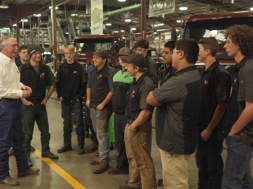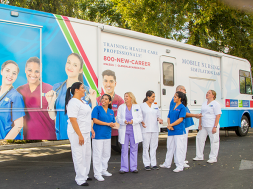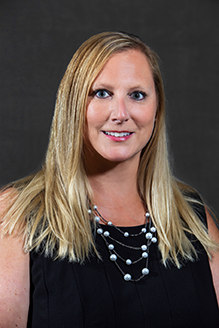
Soderberg on Hiring and Cultivating Strong Teams: Be Humble, Hungry and Smart
Interview with Melissa J. Soderberg, President, Quest Education and Career Quest Learning Centers
Leadership. Webster’s New World Dictionary defines it as the ability to lead, command, direct or guide. Peter Drucker, management consultant and author, once said: “Management is doing things right; leadership is doing the right things.”
What are the right things and how do you lead effectively? That’s what “Career Education Review” hopes to uncover, and much more, in its series on leaders within the career education sector.
Q: Tell us about your background in higher education.
A: While living in Los Angeles and working in the tech industry in marketing and public relations, which is what my degree was in, the big tech bust happened. Los Angeles is an expensive city to live in jobless, so I moved back home with my dad in Chicago. I was looking for jobs in my field, but it was a tight job market. I went to a job fair, and there was a school recruiting for admissions advisors, so I went through the interview process with Career Education Corporation and was offered a job as an admissions rep at American InterContinental University Online. I was an admissions rep, and I was picked to move over from AIU to basically start up Colorado Technical University Online.
What was exciting about that is I got to see a school go from literally zero students to thousands of students by the time I had left.
Q: Tell us about Career Quest Learning Centers.
A: Career Quest started in 1995 as a staffing agency; they would place people in the Lansing area in various jobs. One of the things that employers would ask for is somebody that’s Microsoft Office certified. This caused the owners, the Brewers, to start a school that has certifications, so they could help place people into the industry. Eventually, the staffing side closed and it evolved into Career Quest Learning Centers. The main campus is in Lansing, and we have branch campuses in Jackson, Mount Pleasant and soon to be Bay City.
Q: What are some of your successful programs and why do you think they’re successful?
A: Most of our programs lie in Allied Healthcare, IT, Business and Legal. Our most popular program is Medical Assisting, which is the biggest draw at all of our campuses and is really hands-on. One of the things that we emphasize at Career Quest is not just learning the material, but learning soft skills. Our students are here because they’re ready for their career, not just a job. We take it very seriously to make sure that we turn out those professionals at the end of the day, and employers know these students are going to be polished and know how to act on a job site.
Q: What do you think makes Career Quest stand out from other higher education schools?
A: There are two things that make us stand out from other schools – our level of service and our passion. Our faculty knows all students by name, their situations, what motivates them, and what they want to do when they graduate. All the way back from my CEC days I heard it takes a special kind of person to work in this sector; it does. You have to be OK with being somebody’s mentor, cheerleader, mom or dad, inspiration, boss and sometimes having to have difficult conversations. There are days where it can be emotionally draining, but graduation is the payoff. That’s when you see all your hard work come to fruition.
Q: Do you find that the faculty and staff come in with that passion, or do you help cultivate it?
A: I think we help cultivate it. We are really big on our culture and teamwork here. I think it’s something you can’t help but get swept away in. People who work here either love it, and they’re lifers, or they’re not a good fit. It’s not that they’re not good people; it’s just this sector is not for everybody.
Q: How do you recognize those people?
A: We can teach people how to be teachers and what they need to know to be successful here, but if you are not somebody who understands our demographic of students, and just want to come in, spew your knowledge and leave without caring about the students, you’re not a good fit for us. I want to see fire and passion in somebody’s eyes.
We actually hire by humble, hungry and smart, which is based on a book called “The Ideal Team Player.”
You have to be humble because our students don’t need somebody who thinks they’re better than them. You have to be hungry with passion and want to help these students. You have to be smart, and I’m not talking about book smart, I’m talking about people smart.
Q: You have a unique perspective of working for a large school group and now a smaller one. What are some of the differences?
A: It’s very different, for me especially because I grew up in online. We are talking 1,000 reps versus the 12 that I have here for four campuses. Dealing with a student face-to-face is so different than dealing with them online or over the phone. You have to be so much more invested in an on-ground school, especially a small school. When I was Senior Director of Student Affairs for CTU, I had a giant staff. I had a lot of levels and layers, with the time to think big picture and work with my team to fix issues. Here, I have a great team, but it’s small. If the toilet clogs, guess who’s plunging it? It’s me. I don’t have the staff to do that.
I think it’s more rewarding to work at the smaller campus personally. That could just be because I get to see the look on the students’ faces. I get to work with them every day versus being at a level where you’re not working with the students all the time.
Q: What changes or ideas have you implemented that you believe help make Career Quest successful?
A: I’m a big people person and as Richard Branson says, “Clients do not come first. Employees come first. If you take care of your employees, they will take care of the clients.” Happy employees equal happy customers.
Happy clients equal happy students. I focus a lot on our employees, teamwork and culture.
I feel right now that Career Quest has the best team that we’ve ever had.
Q: What do you think makes you a successful leader?
A: I have an amazing team of people. I’m not going to say I was handed an amazing team. I’ve had to work and cultivate relationships with my teams. A leader is nobody without a team.
Q: How would you describe your management style, and why do you think it works?
A: I’ve made up my own management style. I call it the chameleon. You can’t just have “a” style and try to fit a square peg into a round hole for every situation. So I feel like I have to change my management style depending on the situation. Sometimes I can be autocratic, other times democratic. Sometimes I can be persuasive while other times I am laissez-faire. It really depends on the situation. I try to look at it big picture before I decide how I’m going to go into it so that we don’t have to back up and start over again.
Q: How do you keep your staff motivated, especially in today’s environment?
A: It can be tough. I think for my direct staff the way I keep them motivated is by letting them know they’re doing a good job, but I also let them do their job. If I know somebody is good at something, I am not going to micromanage them, and that keeps them motivated. At the campus level, I think we motivate by trying to keep a fun atmosphere and creating a community for our students because that’s the most important thing in retention. I think we have it for our staff as well. I think you stay motivated when you come to work every day and you like where you work and you like the people you work with. Some days are tough, especially with our students, but how can you not be motivated by seeing that person who walked into your admissions office crying because of a lost job and then when you see that same person walk across that stage at graduation and he/she is a completely different person?
Q: What are your current challenges as President?
A: One of my current challenges as a President is finding talent. I’ve lived in Chicago, Los Angeles, and Atlanta and I’ve never struggled to find talent like I have in Michigan. It’s not just at this campus. It’s at all three campuses. We really have to work on different ways of finding talent. To that end, we just hired a new Director of Talent Acquisition, who I think is going to do a fabulous job.
Q: Are certain positions more difficult to fill, or is it just a general lack of talent?
A: It’s general, [except with] our Mount Pleasant campus; the talent that came out of that is crazy. We’ve been open there for almost a year now, and we’ve had zero turnovers. We have good talent out there, and we’ve nurtured it and grown that campus culture. That’s what I’m trying to replicate everywhere else, especially as we open new campuses.
You also have to have that eye when hiring. You have somebody working in a role, but you have to have that eye to be able to see that they may not be a superstar in this role, but they will be jackpot in the next role. You have to be able to move people around. I fully believe that the more invested in and the more you know about the student lifecycle, the better you are for the company. If you look at my executive management team, none of them were hired for that job. They’ve all worked multiple jobs on their way up the ladder.
Q: What do you think are the largest challenges facing career education?
A: The perception. I’ve read articles and after seeing some of the comments from the internet trolls, I really believe their minds would be changed if they came here and did what we did for a week. Community college is not for everybody, just like a four-year school is not for everybody.
But that doesn’t mean that our students should not have the same opportunities as everybody else.
If this is the right avenue for them, they should be able to choose that avenue.
Q: What do you see as the future of higher education in the next five or 10 years?
A: You read articles about how college as we know it is going to go away. Technology plays a big part in that. But I also feel like sometimes our students in career colleges are in our schools because they don’t want to go to school at a 100 percent online school. They come here because they need that support of the instructors, for somebody to hold them accountable. I think that higher education is important and traditional is not for everybody.
Q: What do you see yourself doing in the next 5-10 years?
A: Honestly, I still see myself here at Career Quest continuing to grow the company and our culture, and cultivating good talent while continuing to turn out amazing people into the workforce in Michigan, while hopefully expanding into the Midwest. Our goal is to be the best career college in Michigan.
Q: What are your short-term and long-term goals for Career Quest?
A: For short-term it is to get this Bay City campus up and running and come out of the gate as successful as our Mount Pleasant campus did. Long-term is continued growth, looking at different programs that we can go into, growing into different markets and possibly even into different areas and programs that are currently out of scope.
Q: If there was one tip you could give other leaders in the career education sector, what would that be?
A: Don’t lose faith. I think that we have to look at what we do and who we serve and our outcomes as a whole. We have a lot to be proud of. I think we shouldn’t lose faith. What we do is good, and we need to recognize that.
MELISSA SODERBERG Career Quest Learning Centers President, has worked in the field of education for most of her adult life. She says she loves helping people explore their goals and achieve them as efficiently as possible.
She joined Career Quest in July 2010 as the Campus Manager for the Lansing school. And she was promoted to President in 2016. During her tenure, the school has grown from two campuses to four, with the newest in Bay City, opening in April 2018.
She got her start in the education business working for Colorado Technical University, a for-profit online education company with a global student base, from 2004 to 2007, serving in multiple roles including Senior Director of Student Affairs.
She took a brief break from education (kind of) when she went to work as the Executive Director of the American Mold Builders Association, a not-for-profit trade organization, from 2007 to 2010. But even during that time, she served as an adjunct instructor for Colorado Technical University, teaching classes in business English and introductory college concepts. “It’s in my blood. I love this business,” she says.
Her expertise has been featured in many trade publications, including the Wall Street Journal.
Soderberg earned her MBA from Colorado Technical University in Colorado Springs, and her BA in Communications from Georgia State University, in Atlanta.
She is married to Craig and they have two children, Cameron, 13 and Cooper, 4. All three of her boys play hockey so you can find the family at the local ice rink most weekends.
Contact Information: Melissa J. Soderberg // President // Quest Education and Career Quest Learning Centers // 517-853-7203 // msoderberg@careerquest.edu // https://www.careerquest.edu









